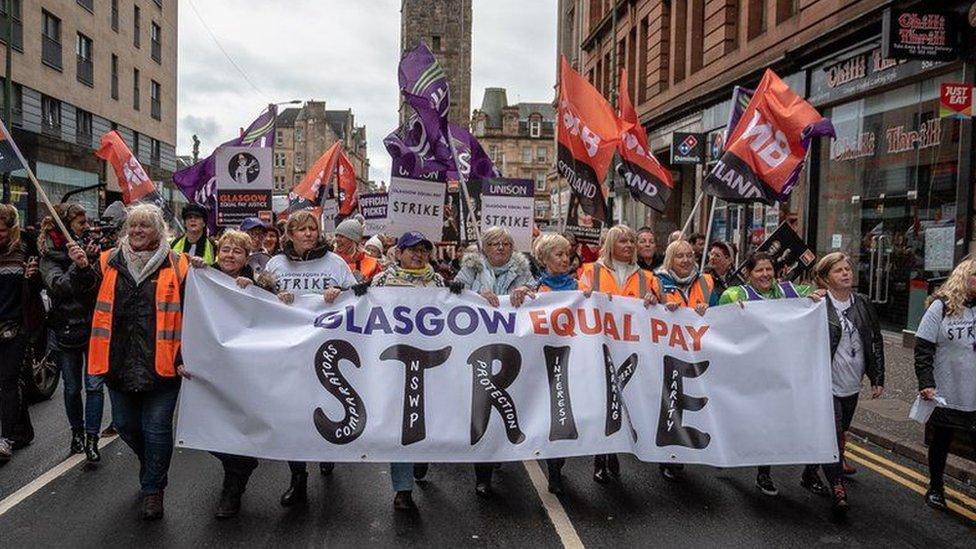Hundreds of schools in Scotland could shut over pay dispute
- Published
- comments
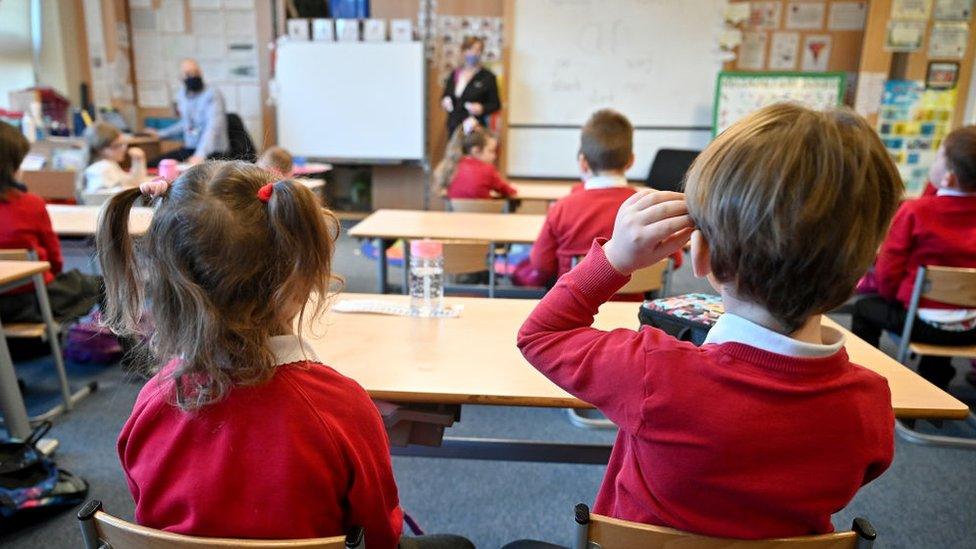
School staff, excluding teachers, could be out on strike when the new school year begins next month
Hundreds of schools and nurseries across Scotland might have to shut at the start of the new term if industrial action over staff pay goes ahead.
Council employees who work in education settings and refuse centres voted for strike after rejecting a 2% pay offer.
Unions said the walk-outs could happen after pupils return from the summer break in August.
The Scottish government said it was urging all parties to find a resolution to avoided industrial action.
Cosla, the local authority body, said they were waiting for the Scottish government to respond to requests for extra funding for councils.
A strike ballot of about 25,000 council workers from the Unison, Unite and GMB unions was said to be the largest in more than a decade.
Unite confirmed that its local government membership in 26 councils, and members at Tayside Contracts, voted for industrial action.
The required 50% turnout threshold required by the Trade Union Act, external was exceeded in nine Unison local authority branches -Glasgow, North and South Lanarkshire, East Renfrewshire, Inverclyde, Stirling, Aberdeenshire, Clackmannanshire and Orkney.
Workers in waste and recycling were also part of the ballot and could leave rubbish "piling up in the streets" if workers do not get a better offer, unions warned.
Wendy Dunsmore from Unite said: "Our members are at the end of their patience.
"They are being forced to take this action due to being completely undervalued despite working throughout the pandemic.
"In the coming weeks we will now plan for targeted strike action in 26 councils across Scotland and the blame for this lies squarely with Cosla and the first minister."
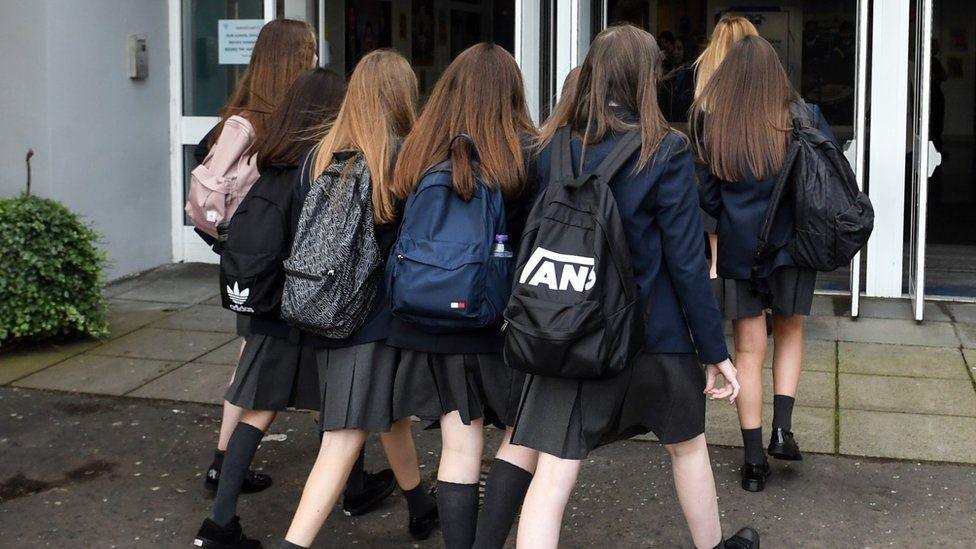
Johanna Baxter, head of local government at Unison Scotland, told BBC Radio Scotland's Good Morning Scotland programme that the "measly 2%" increase council workers were offered in March was not appropriate when inflation was over 10%.
She pointed out that this week council workers in England had been offered a flat rate uplift of £1,925 - a 10.5% increase for those on the lowest pay.
Ms Baxter said workers were "fed up of being used as a political football" between council body Cosla and the Scottish government.
"We do know that local government has suffered real terms cuts to their budgets for the last 10 years or so," she said.
"We also know that the Scottish government controls 80% of council budgets, so there is definitely a role for the Scottish government to play, but Cosla doesn't get to wash their hands.
"Fundamentally, they do need to pay their workers more."
When will the strikes be held?
Representatives from Unison, Unite and GMB are meeting later to discuss when to hold the strikes and which workers they will "take out". Their members include school cleaners, janitors and dinner staff.
Ms Baxter warned: "It's likely that schools would return from the holidays, it may be that we would then take action following their return.
"Bear in minds these councils are some of the largest in Scotland. This is likely to affect hundreds of schools across the country."
It is estimated that more than half of Scotland's 250,000 council workers earn less than £25,000 a year for a 37-hour week.
Pay settlements for council workers - apart from teachers - are the responsibility of Cosla and are determined through negotiations at the Scottish Joint Committee (SJC).
A Cosla spokesperson said: "As employers we have a responsibility to ensure that any pay deal offered is both sustainable and affordable and that is why we are unable to go beyond the current offer at this point. "
The unions said they had called for a summit with Finance Minister Kate Forbes and First Minister Nicola Sturgeon in a bid to avoid strike action.
Ms Forbes wrote to Unison last month saying "it would not be appropriate to interfere in these negotiations, given their devolved nature" and "respectfully declined" a meeting proposed by Cosla.
Scottish government minister Jenny Gilruth told BBC Scotland: "Pay settlements for council workers, and that excludes teachers, are really a matter for Cosla and are determined through negotiations at the Scottish joint committee."
'Thrash out a deal'
She insisted that the government could not "directly intervene" in the negotiations.
Ms Gilruth added: "It is for the trade unions to negotiate with Cosla, but of course we are urging all parties to continue that dialogue to seek a resolution which avoids industrial action."
Opposition parties have called on the SNP/Green government to do "everything possible" to avert school closures.
Miles Briggs, Scottish Conservative shadow secretary for local government, said the prospect was "particularly concerning" after the disruption to children's education during the pandemic.
"All parties must get round the negotiating table to thrash out a deal - especially the SNP government," said.
Scottish Liberal Democrat leader Alex Cole-Hamilton added: "Children's interests have been sorely neglected over several years of a devastating pandemic.
"The responsibility for these strikes lies squarely with the SNP/Green government. They need to step up to the plate and sort it out."
The leader of Stirling Council also urged Cosla to pursue a meeting with the government and unions to "seek additional funding to make a decent pay offer and avoid industrial action".
Chris Kane said he had "every sympathy" with workers seeking fair pay.
"It simply is not factual for the Scottish government to say pay negotiations are nothing to do with them when they hold the purse strings," he said.
- Published26 July 2022
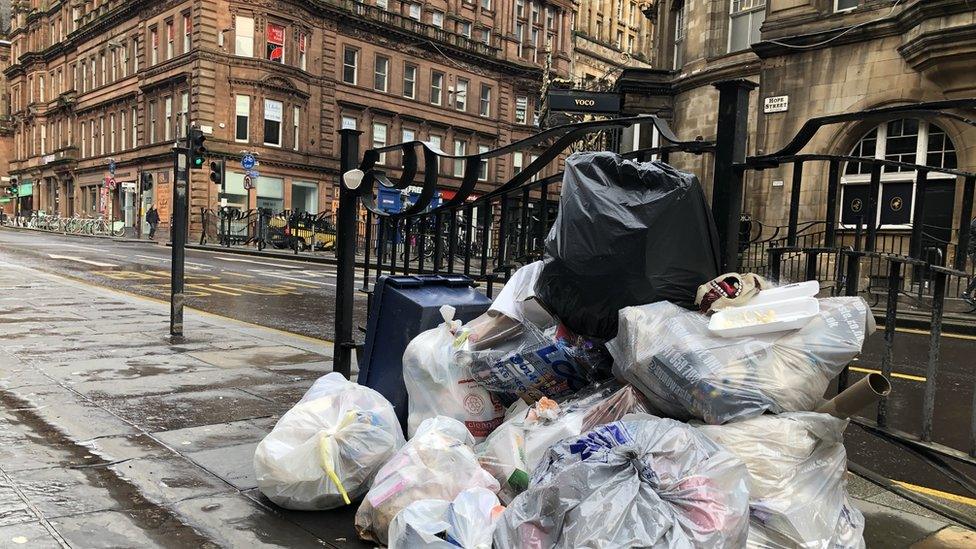
- Published22 June 2022
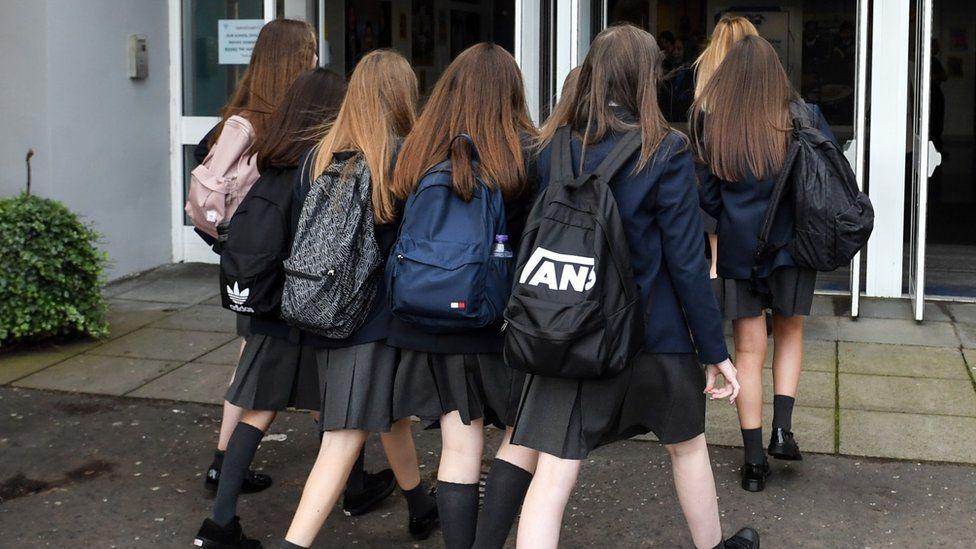
- Published13 April 2022
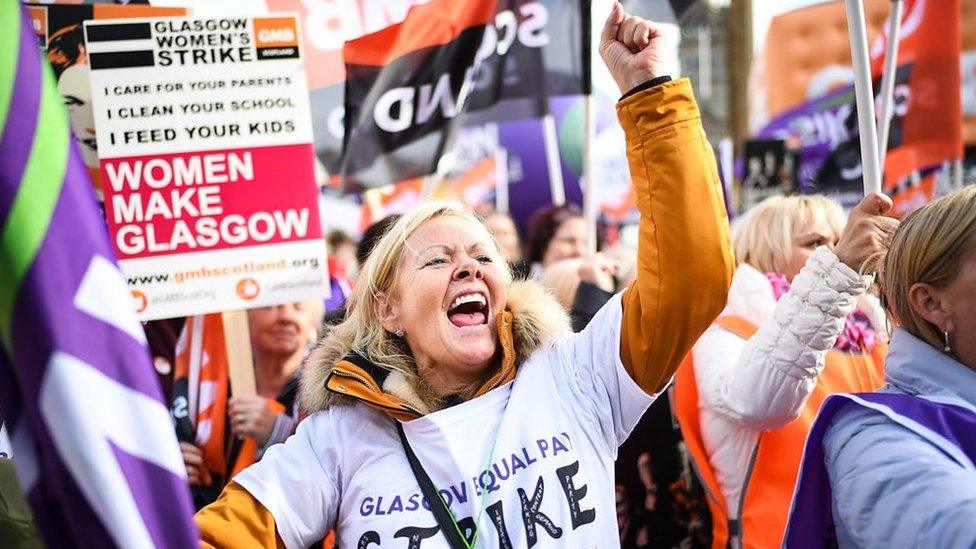
- Published25 March 2022
